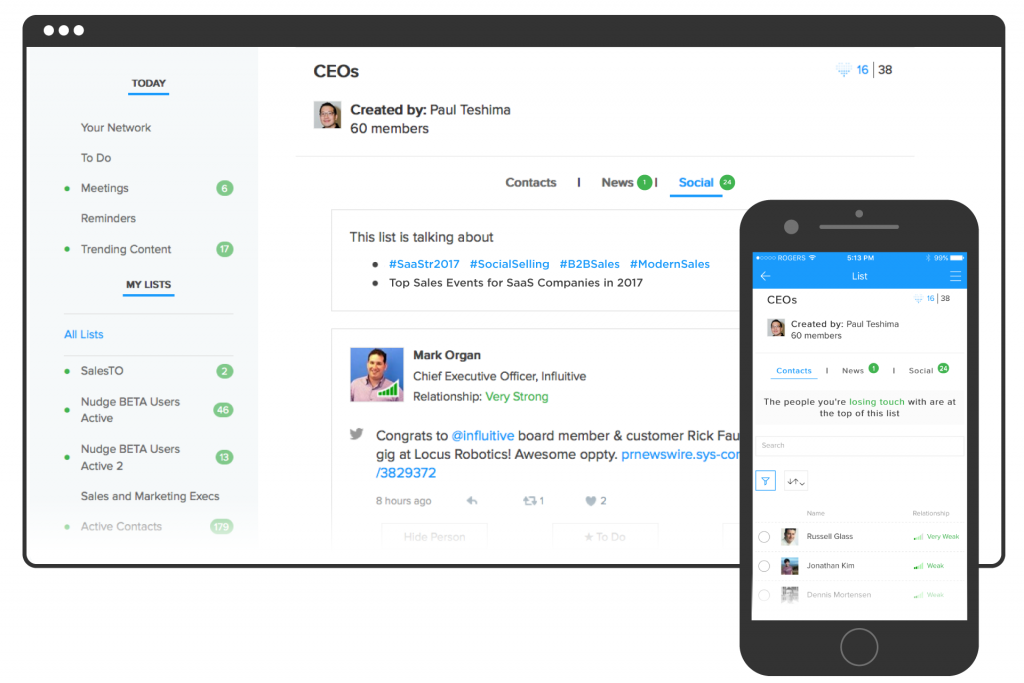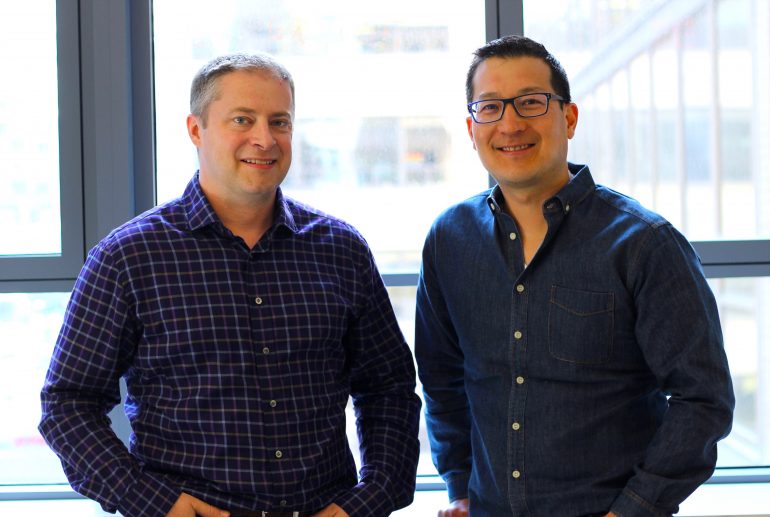Toronto-based Nudge, a platform that allows sales professionals to leverage relationship strength in order to find their best customers, announced a raise of $6.5 million CAD ($5 million USD) in seed funding.
The funding was led by OMERS Ventures, with participation from existing personal investors
including Jill Rowley, a top social selling speaker and influencer, and previous investors in Eloqua, Neal Dempsey and Brad Woloson.”
“High expectations from users paired with lower cost of entry makes the market very competitive very quickly.”
For Nudge co-founders Steve Woods and Paul Teshima, raising the seed funding is familiar territory — Teshima and Woods are the founding execs of Eloqua, which the two successfully filed for IPO and sold to Oracle for $957 million in 2012. The co-founders said that their experience at Eloqua — which had them working in marketing automation and revenue performance management software — showed them that relationships are key to getting deals.
Despite this, “Everyone went about their day managing the less important things,” said Woods. “We looked at this landscape and realized there’s a huge opportunity here to put together a view of relationships, let you manage them, and let you turn that into a strategy to win deals based on the strength of those relationships.”
Nudge’s app syncs together its users’ networks — including contacts, email, calendar, and social — and measures and tracks the strengths of those relationships against the thousands of weak contacts that they have. With Nudge, users can find opportunities to reach out to potential buyers based on status updates and social activity, and companies can take relationships within their network into the sales team of their organization. Nudge allows companies to see which of their team members have the best access to buyers, instead of having members of their sales team reach out to key decision makers at random.
Using the funding, the company is working on improving the platform, especially the features that allow its clients to leverage relationships across teams.

“You don’t start off by needing sales people. You historically needed sales people if you wanted to get the facts and information on something you were about to buy, so that was the point of entry. Now, you’ve got the facts and figures available online,” said Woods. “Now there’s an open question of, ‘why would I ever bother having another human tell me about a space?’ But you get into this trust concept where digesting information takes a lot of work, so it’s much simpler for me to say, ‘who do I know in this space who is knowledgeable and trustworthy, and can I ask them what the answer is rather than digesting mass amount of information?”
As Canada’s startup ecosystem moves away from being nascent and early stage, it has now reached a point that executive talent with experience in growing companies will be key to building Canada’s future billion dollar companies. For their part, Nudge’s co-founders are happy to be part of that trend, and find that it’s much easier now to find fellow founders and startups for support than when they first started Eloqua.
“There’s an interesting thing we noticed, and this is something that I think the Canadian ecosystem is starting to get the benefit of because you haven’t had as many second and third time entrepreneurs on their next business after a successful exit as, say, the Valley or the east coast. But this is as helpful as capital or new entrepreneurs,” said Teshima. “We’re in year two of Nudge as a startup, but because of the 14 years at Eloqua, it’s like we’re in our 16th year of a startup career. That makes it a little different as a second company.”
The pitfall of that, though, is that second-time founders must constantly evaluate whether their past experience — however extensive — is still relevant for the problems of today. When Woods and Teshima were leading Eloqua, machine learning and big data didn’t exist in any real form, whereas today they can be considered essential to a startup’s platform.
“In this day and age, Slack is the bar. When you have a product, a user wants to download it, immediately get value be up and running. High expectations from users paired with lower cost of entry makes the market very competitive very quickly,” said Teshima. “On the same side, if you are tackling a hard problem, you have to take a certain approach that doesn’t rely on speed, and that’s where our experience, raising capital, all those things come into our favour because if we put Nudge model into classic Y Combinator, pound something out model, we wouldn’t get to a point where we could tackle this difficult problem in that time.”


